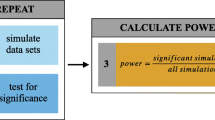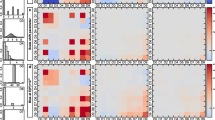Abstract
This paper considers the problem of procuring reliable information on sensitive quantitative characteristics without exposing respondents’ identities. A generalized optional randomized response procedure is proposed, which enables us to estimate some unknown population parameters unbiasedly. In particular, conditions for the assurance of unbiased estimations of mean, variance and sensitivity level are studied. Efficiency comparisons are also carried out to study the performance of the proposed procedure.
Similar content being viewed by others
References
Bar-Lev SK, Bobovitch E, Boukai B (2004) A note on randomized response models for quantitative data. Metrika 60: 255–260
Bhargava M, Singh R (2000) A modified randomization device for Warner’s model. Statistica 60: 315–321
Chang HJ, Huang KC (2001) Estimation of proportion and sensitivity of a qualitative character. Metrika 53: 269–280
Chaudhuri A (2001) Using randomized response from a complex survey to estimate a sensitive proportion in a dichotomous finite population. J Stat Plann Infer 94: 37–42
Chaudhuri A (2004) Christofides’ randomized response technique in complex sample surveys. Metrika 60: 223–228
Chaudhuri A, Mukerjee R (1988) Randomized response: theory and techniques. Marcel Dekker, New York
Chua TC, Tsui AK (2000) Procuring honest responses indirectly. J Stat Plann Infer 90: 107–116
Greenberg BG, Kubler RR, Abernathy JR, Horvitz DG (1971) Applications of the RR technique in obtaining quantitative data. J Am Stat Assoc 66: 243–250
Gupta S, Gupta B, Singh S (2002) Estimation of sensitivity level of personal interview survey questions. J Stat Plann Infer 100: 239–247
Hosseini JC, Armacost RL (1993) Gathering sensitive information in organization. Am Behav Sci 36: 443–471
Huang KC (2004) A survey technique for estimating the proportion and sensitivity in a dichotomous finite population. Statistica Neerlandica 58: 75–82
Kerkvliet J (1994) Estimating a logit model with randomized data: the case of cocaine use. Aust J Stat 36: 9–20
Murthy MN (1967) Sampling theory and methods. Statistical Publishing Society, Calcutta
Padmawar VR, Vijayan K (2000) Randomized response revisited. J Stat Plann Infer 90: 293–304
Scheers NJ (1992) A review of randomized response techniques. Meas Eval Couns Dev 25: 27–41
Singh S, Singh R, Mangat NS (2000) Some alternative strategies to Moor’s model in randomized response sampling. J Stat Plann Infer 83: 243–255
Singh S, Mahmood M, Tracy DS (2001) Estimation of mean and variance of stigmatized quantitative variable using distinct units in randomized response sampling. Stat Pap 42: 403–411
Umesh UN, Peterson RA (1991) A critical evaluation of the randomized response method: application, validation, and research agenda. Sociol Methods Res 20: 104–138
Van Der Heijden PGM (2000) A comparison of randomized response, computer-assisted self-interview, and face-to-face direct questioning. Sociol Methods Res 28: 505–537
Warner SL (1965) Randomized response: a survey technique for eliminating evasive answer bias. J Am Stat Assoc 60: 63–69
Author information
Authors and Affiliations
Corresponding author
Rights and permissions
About this article
Cite this article
Huang, KC. Unbiased estimators of mean, variance and sensitivity level for quantitative characteristics in finite population sampling. Metrika 71, 341–352 (2010). https://doi.org/10.1007/s00184-009-0234-7
Received:
Published:
Issue Date:
DOI: https://doi.org/10.1007/s00184-009-0234-7




